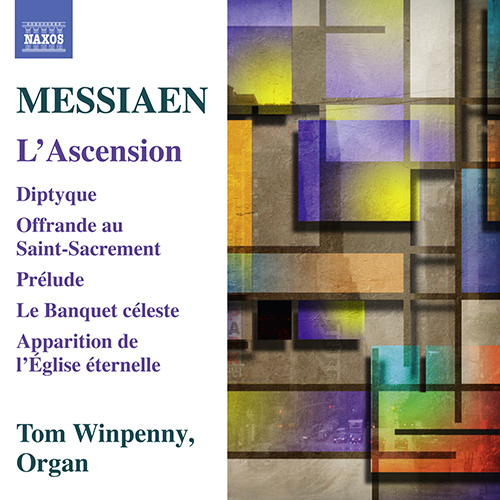MESSIAEN, O.: Organ Works - L'Ascension / Diptyque / Offrande au Saint-Sacrement / Prélude / Le Banquet Céleste (Winpenny)
Olivier Messiaen’s early organ works helped establish him as a towering figure of 20th-century music. L’Ascension is the most significant of these, with its solemn majesty, dazzling colours and near-static serenity and timelessness. These qualities were already present in Le Banquet céleste, Messiaen’s first published organ work, and in Apparition de l’Église éternelle—a powerful representation of the eternal church emerging and fading from view. The two works discovered posthumously in 1997, Prélude and Offrande au Saint-Sacrement, show the influence of Dupré and Tournemire. Tom Winpenny’s acclaimed recording of Messiaen’s La Nativité du Seigneur can be heard on Naxos 8.573332.

Born in New York City, the American composer, pianist and conductor Charles Wuorinen has been greatly influenced by Stravinsky, Schoenberg, Stefan Wolpe, Babbitt and Elliott Carter. He has taught at a number of leading schools in the United States and been the recipient of many awards and honours, holding a central and important position in American musical life.
Vocal and Instrumental Music
A prolific composer in a variety of genres, Wuorinen has drawn inspiration from a number of sources, from fractal geometry and Gregorian chants to Indian rāgas, using extensions of serial technique and electronic devices. His operas include a version of Salman Rushdie’s Haroun and the Sea of Stories, his songs settings of poems by Dylan Thomas, Seamus Heaney, James Fenton and John Ashbery, and his orchestral works some eight symphonies and a number of concertos.
His chamber music involves a varied collection of instruments and includes a Quartet for percussion. Wuorinen’s Dante Trilogy is a series of three ballets written between 1993 and 1996 based on the three books of Dante’s Divina Commedia.































